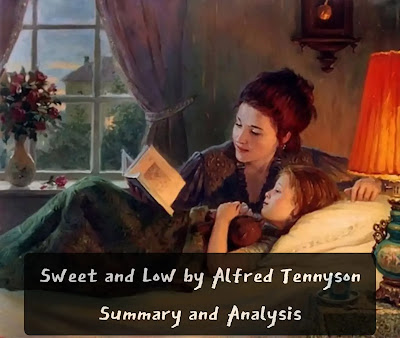Also Read
Sweet and low, sweet and low,
Wind of the western sea,
Low, low, breathe and blow,
Wind of the western sea!
Over the rolling waters go,
Come from the dying moon, and blow,
Blow him again to me;
While my little one, while my pretty one, sleeps.
Sleep and rest, sleep and rest,
Father will come to thee soon;
Rest, rest, on mother's breast,
Father will come to thee soon;
Father will come to his babe in the nest,
Silver sails all out of the west
Under the silver moon;
Sleep, my little one, sleep, my pretty one, sleep.
Introduction
Sweet and Low is one of the insertions of 1850 and occurs at the end of Canto II of The Princess. It is such a simple poem that no annotations needed.
Summary
The song is a lullaby. The mother sings to her child of the sailor out at sea. She prays to the western wind to blow gently, and bring the sailor, her husband and father of the child, back home to her. Let a favourable wind blow so that the father is united with the child and the husband comes home to the wife. The mother wants the child to sleep peacefully on her breast and not worry about the father who will come home soon. The 'silver sails' of the ship will bring the sailor home from the west under the silver moon.
Critical Appreciation and Analysis
The lyric is simple in content and in style. It sings of the homely virtues of conjugal fidelity, parental love and domestic felicity. There is hardly any thought or reflection in the poem, it is a pure lyric, but infused with an indescribable magic. In the context of The Princess, it offers a criticism of a life devoted to intellectual pursuits excluding the warmer human emotions - the kind of life led by Princess Ida and her six hundred maidens. The song brings home to them the virtues of domestic happiness and ties of family.
As for language and versification, we notice particularly the beautiful alliteration of the sounds "s, w and I," interwoven in the first four lines, and of 's' and 'r' in the second stanza, and the recurrence of the 'o' sound in the first stanza, giving a slow, lingering effect. There are only two rhymes in each stanza, but the last line, a longer one which folds the sweetness of each stanza up (to adapt Tennyson's words elsewhere), is independent of these. The two last lines rhyme together, however (or nearly so), thus linking the two stanzas together. But while there is no change in rhyme, the variety in metrical feet is immense for so short a poem.
